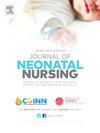Preoperative enteral nutrition in neonates with congenital heart disease: A review of literature
Q2 Nursing
引用次数: 0
Abstract
Congenital heart disease in neonates can pose significant nutritional challenges due to increased metabolic demands and necessary interventions. The use of preoperative enteral nutrition aims to address these deficits, improving growth and recovery. This review assesses preoperative enteral nutrition's efficacy and safety in neonates with congenital heart disease, whilst also identifying potential barriers to implementation of preoperative enteral nutrition, focusing on growth, recovery, and complications like necrotizing enterocolitis. While preoperative enteral nutrition can improve outcomes, concerns about necrotizing enterocolitis particularly in high-risk neonates, limit its use. Recent studies suggest management with human milk, can mitigate necrotizing enterocolitis risk as well as support intestinal maturation, improve immunity and improve growth. However, inconsistent feeding protocols across institutions create variability. Standardized protocols are needed to optimize nutritional outcomes. Further research is crucial to develop evidence-based guidelines for preoperative enteral nutrition, enhancing both immediate and long-term health for neonates with congenital heart disease.
先天性心脏病新生儿术前肠内营养:文献综述
先天性心脏病的新生儿可造成显著的营养挑战,由于代谢需求增加和必要的干预。术前肠内营养的使用旨在解决这些缺陷,改善生长和恢复。本综述评估了先天性心脏病新生儿术前肠内营养的有效性和安全性,同时也确定了术前肠内营养实施的潜在障碍,重点是生长、恢复和坏死性小肠结肠炎等并发症。虽然术前肠内营养可以改善预后,但对坏死性小肠结肠炎的担忧,特别是在高危新生儿中,限制了其使用。最近的研究表明,用母乳管理,可以减轻坏死性小肠结肠炎的风险,并支持肠道成熟,提高免疫力和促进生长。然而,各机构之间不一致的喂养方案造成了差异。需要标准化的方案来优化营养结果。进一步的研究对于制定以证据为基础的术前肠内营养指南至关重要,可以增强先天性心脏病新生儿的即时和长期健康。
本文章由计算机程序翻译,如有差异,请以英文原文为准。
求助全文
约1分钟内获得全文
求助全文
来源期刊

Journal of Neonatal Nursing
Nursing-Pediatrics
CiteScore
2.00
自引率
0.00%
发文量
143
期刊介绍:
Aims & Scope: This is the practical, bimonthly, research-based journal for all professionals concerned with the care of neonates and their families, both in hospital and the community. It aims to support the development of the essential practice, management, education and health promotion skills required by these professionals. The JNN will provide a forum for the exchange of ideas and information between the range of professionals working in this field; promote cooperation between these professionals; facilitate partnership care with families; provide information and informed opinion; promote innovation and change in the care of neonates and their families; and provide an education resource for this important rapidly developing field.
 求助内容:
求助内容: 应助结果提醒方式:
应助结果提醒方式:


